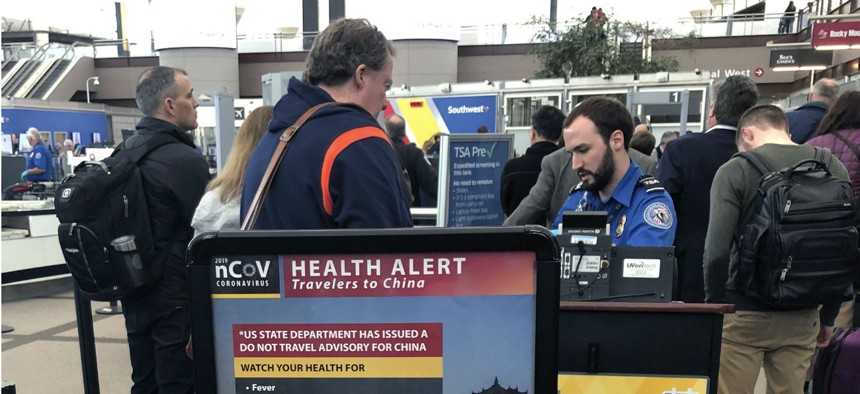Senators Call on OPM to Ensure Feds and Contractors Are Protected as Coronavirus Spreads
The lawmakers pushed for expanding telework and preventing agencies from imposing disciplinary actions or pay cuts that could impede health precautions.
A group of senators on Friday, noting that the federal government is the largest employer in the nation, called on the Office of Personnel Management to take steps to ensure federal employees and contractors will not be penalized for taking health precautions during the COVID-19 outbreak.
The Democratic senators wrote to OPM Director Dale Cabaniss with concerns that the personnel agency’s guidance does not prioritize the health and safety of the approximately 2 million civil servants and 4.1 federal contractors. While acknowledging that the trajectory of the novel coronavirus continues to evolve, the lawmakers said OPM should do more to support federal workers, many of whom face exposure to the virus that causes COVID-19 in the course of their jobs.
“We worry that OPM’s guidance to date does not demonstrate to our nation’s hardworking public servants that the federal government is prioritizing their health, well-being, and economic security,” they wrote. “We urge you to swiftly develop and circulate guidance that does more to reassure them that they will not be penalized for heeding public health guidance, they will continue to receive pay while doing so, and they will not be expected to work while sick.”
The letter was signed by Sens. Mark Warner, D-Va., Benjamin Cardin, D-Md., Tim Kaine, D-Va., Chris Van Hollen, D-Md., Mazie Hirono, D-Hawaii, Brian Schatz, D-Hawaii, Sherrod Brown, D-Ohio, and Gary Peters, D-Mich. They all represent large numbers of federal employees and contractors in their states. They asked Cabaniss to:
- Clarify that employees and contractors who follow Center for Disease Control and Prevention guidance will not be at risk of losing income or disciplinary actions.
- Issue guidance telling employees and contractors they will not have to choose between financial obligations and following health protection guidance.
- Direct agencies to expand telework policies.
- Tell employees and contractors they aren’t expected to work if they’re caring for a loved one (even if they have exhausted paid leave benefits).
- Educate agencies and their human resources departments on the types of paid leave workers can use.
- Work with health insurance companies to make sure employees can afford preventative care and treatment in the event they contract the virus.
On Thursday, three House Democrats reintroduced a bill to protect telework at agencies and expand access due to the coronavirus. While OPM and the CDC have advocated for telework, some agencies have recently scaled back telework options for employees.
As the virus continues to spread globally, many federal employees and contractors have a particular risk of exposure because of the nature of their work. This includes Internal Revenue Service employees handling envelopes and documents from taxpayers nationwide, Customs and Border Protection officers screening people at ports of entry and military personnel and Defense contractors working at installations in high-risk countries.
The senators said that, as was demonstrated during the last government shutdown, many federal employees and contractors live paycheck to paycheck. They asked OPM to be generous and make sure employees can protect themselves without fear of losing pay.
Anthony Marucci, OPM director of communications, told Government Executive, “We have received the letter and will respond to Congress as necessary.”
NEXT STORY: Why Having Fewer OSHA Inspectors Matters




